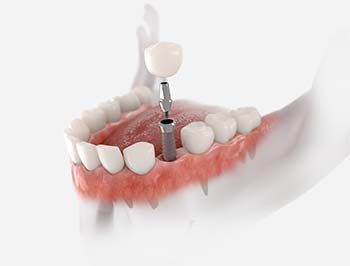Everyone knows that smoking is detrimental to your overall health. In fact, it is one of the primary causes of death and illness around the world. Many people are living with smoking-related illnesses, including heart disease, pneumonia, cancer, stroke, and more.
However, most people don’t give much thought to the impact of smoking on oral health including tooth staining, tooth loss, gum disease, and oral cancer. One of the very first questions patients are asked in a dental implant consultation is: “Do you smoke or use tobacco products?”
Smoking has a detrimental impact on dental implant treatment and can ultimately lead to implant failure. It slows down healing and osseointegration and makes it harder to keep the area around the implant clean. In this article, we’ll explain more about smoking and dental implants.
Can I Get Dental Implants if I Smoke?
Smoking does not automatically disqualify you from getting dental implants- but it may have an effect. Your dentist will determine if you qualify for implants during your consultation.
That being said, it is important to understand that smoking can have a detrimental impact on the success of your implants. You may be encouraged to quit smoking or to at least reduce the amount you are smoking before beginning the dental implant process. Most dentists agree that you should cut back to no more than 10 cigarettes per day. If you’re a heavy smoker or have smoked for a long time, some dentists may refuse to provide treatment.
If you are a smoker, your dentist should explain the potential complications of dental implant treatment. You will need to consent to treatment before they can proceed.
During the initial consultation, the dentist will perform a comprehensive examination, as well as review your medical and dental history and your social and smoking habits. This will allow them to establish a treatment plan for the best possible outcome. Proper oral hygiene and healthy gums and jawbone are critical for successful treatment. If you have gum disease or other oral health concerns, those will need to be addressed first.
Smoking and Bone Grafts
One of the primary requirements for dental implants is adequate jawbone density. If your jawbone is inadequate, a bone graft can build up the bone to create the stable base that is required. However, smoking can have a negative impact on healing of the bone graft, which can impact the entire dental implant procedure.
Impact of Smoking on Dental Implants Explained
Smoking is one of the leading causes of tooth loss and may be the reason that you need tooth replacement. It’s important to note that smoking dramatically restricts healing. The nicotine in cigarette smoke constricts your blood vessels, reducing blood flow and oxygen to the soft tissues, which impacts the body’s natural immune response.
This significantly slows down healing and has a detrimental impact on the long-term health of your gums and jawbone. Smoking prevents successful osseointegration, increasing the risk that implants will not heal properly, as well as the risk of implant failure.
In addition, the smoke can burn the soft tissues in your mouth, which thickens the top layer of skin cells. This can damage or block your salivary glands, which allows bacteria and plaque to build up because the saliva is not being produced to wash it away. Your risk of dry mouth also increases with the lack of saliva production.
Smoking After Tooth Extraction
If you are a smoker and need to have a tooth extracted, you should be aware of a condition known as “dry socket”. This is a very painful condition that may occur after you have a tooth removed.
When a tooth is removed, a clot will form over the socket to protect it and facilitate the healing process. It protects the jawbone and nerve endings and encourages the growth of new gum and jawbone tissue.
Smoking increases your risk of dry socket because the physical action of sucking on the cigarette can cause the clot to come out. In addition, the chemicals in tobacco products can prevent/slow down healing and cause infection at the surgical site. When the clot is dislodged, the socket is left open, exposing the nerves and bone to food debris and bacteria.
Smoking After Dental Implants
Your dentist will give you specific aftercare instructions following your dental implant procedure. If at all possible, it is recommended that you quit smoking completely. However, if you are unable to do this, try to avoid it for at least three months or as long as possible. This will allow the process of osseointegration to get started. For many patients, it may be difficult to wait this long- you can discuss your specific situation with your dentist to create a more realistic timeline.
For several days following implant placement, it’s important to avoid disturbing the implant site. If you do, you could dislodge the clot, which can cause bleeding. While you can brush your teeth, avoid brushing the implant site directly, avoid rinsing your mouth, and avoid spitting, sucking on straws, and smoking. All of these actions can dislodge the clot, which will slow healing.
Are e-cigarettes harmful?
Some research indicates that e-cigarettes are safer than traditional cigarettes but the full impact of these devices on the body is unknown.
An e-cigarette is a device that contains a heating element that vaporizes liquid. Instead of smoke, the steam created from heating the liquid is inhaled. The most commonly reported side effects of e-cigarettes include dryness and irritation of the mouth/throat.
These side effects don’t support healing following dental implant placement and may increase the risk of tooth decay. One review indicates that e-cigarettes are 95% less harmful than traditional cigarettes, which can be a major motivator to convince people to quit smoking.
Tips for Caring for Dental Implants When You Smoke
If you decide to continue smoking after getting dental implants, you must be extra vigilant with your oral health maintenance practices. Smoking increases your risk of plaque buildup and can cause gum disease to develop and advance quickly.
If you neglect your implants, bacteria and plaque can build up, which will turn into tartar, ultimately leading to gingivitis and gum disease. If left untreated, a condition known as peri-implantitis can develop, which is the equivalent of periodontal disease around the natural teeth. This condition is characterized by soreness, bleeding, and bone loss around the implants- which can ultimately lead to implant failure because your dental implants, like your natural teeth, depend on healthy jawbone tissue for support.
Ideally, you should brush at least twice daily. When you brush, make sure that you are paying attention to all surfaces of the artificial and natural teeth that can be accessed with a toothbrush. For surfaces that are not accessible with regular brushing, you should use an interproximal brush or a water flosser.
One of the most obvious effects of smoking is tooth staining due to the tar and nicotine in cigarettes. However, you should avoid abrasive toothpaste to remove these stains as they can remove the glaze on porcelain implants and can cause wear on acrylic, leaving the artificial teeth looking dull and damaged.
Regular dental exams and dental cleanings are critical for maintaining your dental implants. You may need to visit more often for the first few months to ensure that healing is progressing as expected.
The best option for your oral and overall health is to quit smoking completely. This will allow your dental implants to heal properly, creating the best possible outcome. While it’s not easy, it can be done with a plan and the right support in place.






